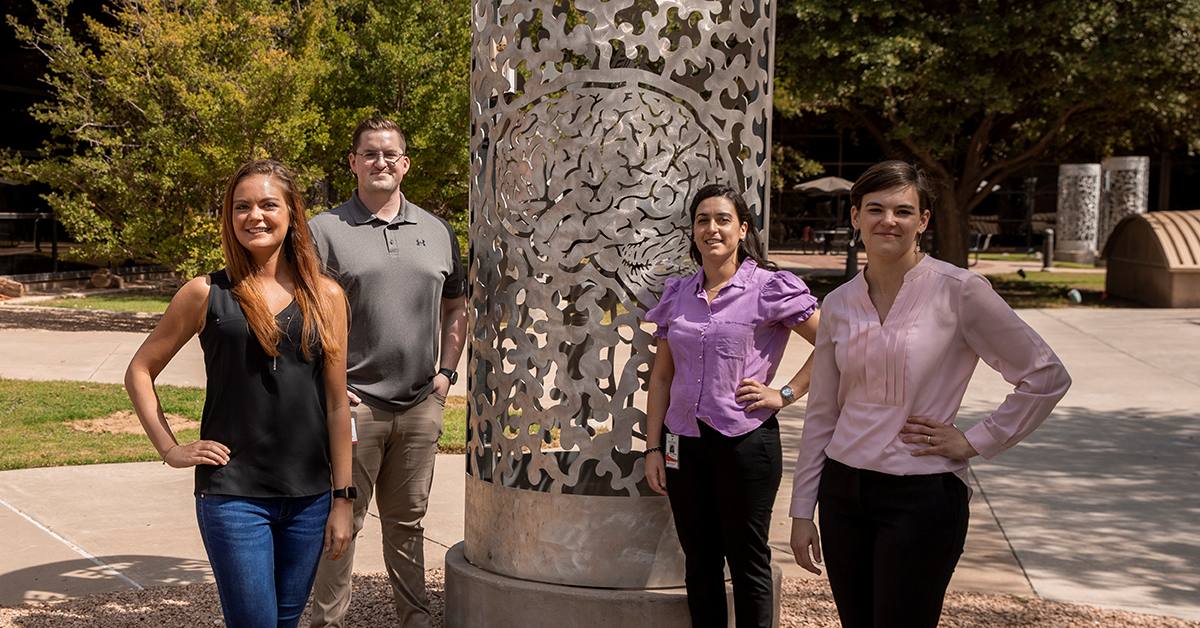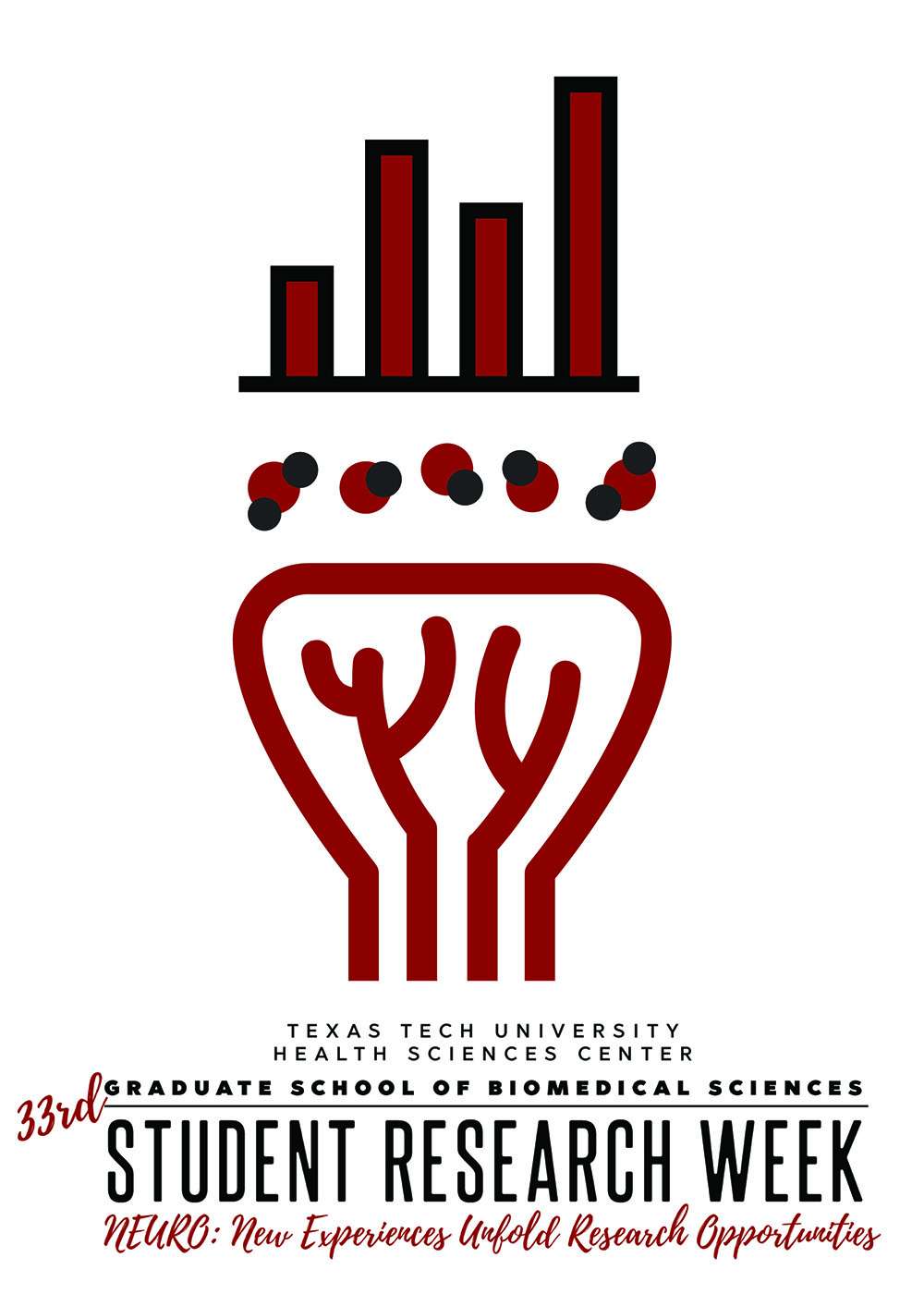2021 Student Research Week A Virtual Success
Online Event Attracted Record Number of Presentations

Just as it did with so many traditional Texas Tech University Health Sciences Center (TTUHSC) events and ceremonies during the last year, COVID-19 impacted the university’s 33rd Student Research Week (March 9-12), making the 2021 event very different from previous years.
Graduate School of Biomedical Sciences Dean Brandt Schneider, Ph.D., said one of the things that makes Student Research Week special is that it is almost entirely developed, organized and run by TTUHSC students.
“The students put in countless, tireless hours and they have done a fantastic job,” Schneider said. “This has been a year full of challenges, but I am immensely proud of the accomplishments of our students. They have displayed amazing resilience, compassion, diligence and dedication. This year has shown us what a vital role research plays in the health and well being of our community and the world. Based on what we have all seen this week from our students, the future is in very good hands.”
Student Research Week provides an opportunity for TTUHSC student investigators to showcase their work and hear presentations from distinguished national speakers related to the year’s specific theme. Mariacristina Mazzitelli, a Graduate School of Biomedical Sciences student and Student Research Week director for 2021, said this year’s event theme was, “NEURO: New Experiences Unfold Research Opportunities.”
“The theme, NEURO, aims to define a bond between the 2021 host department (the Department of Pharmacology and Neuroscience) and Student Research Week, and also encourage the students toward the discovery of the multiple possibilities behind new research endeavors,” Mazzitelli added.
With a moratorium on in-person gatherings still firmly in place due to the pandemic, Mazzitelli said the event was held entirely online. That meant many events that typically happen during the week such as the vendor show, the annual banquet and open poster sessions couldn’t take place this year. This fact that none of the committee members had any previous experience or knowledge about organizing virtual events only added to the challenge.
“Nevertheless, we were able to successfully and smoothly conclude all the virtual poster competition sessions,” Mazzitelli said. “We also created an interactive interprofessional education (IPE) discussion where experts such as Nicole Hines, Dr. Ron Cook, Dr. Jacob Nichols, Dr. Trey Morris, Dr. Ebtesam Islam, Dr. Jeff Dennis, Dr. Sharilyn Almodovar and our new provost, Dr. Darrin D’Agostino, could share their experiences in approaching this devastating pandemic.”

Bryan Roth, M.D., Ph.D., and Susan Amara, Ph.D., were keynote speakers for the event. Roth is the Michael Hooker Distinguished Professor of Pharmacology at the University of North Carolina Chapel Hill School of Medicine where his laboratory is responsible for the discovery and development of the chemogenetic technology known as DREADDs (Designer Receptors Exclusively Activated by Designer Drugs), a revolutionary approach in pharmacology.
Amara, a National Academy of Science Fellow, is the scientific director of the Intramural Research Program at the National Institute of Mental Health. Her research focuses on the signaling properties and physiology of psychostimulant and antidepressant drugs.
On the final day of the event, Drs. Roth and Amara joined a group of students for a roundtable discussion conducted as a Zoom webinar. Schneider, TTUHSC President Lori Rice-Spearman, Ph.D., Texas Tech University System Chancellor Tedd L. Mitchell, M.D., and Department of Pharmacology and Neuroscience Chair Volker Neugebauer, Ph.D., each made short remarks at the end of the day.
“We feel so grateful to all the administration and faculty who took time to give outstanding talks and to all the participants in the roundtable discussion with our speakers,” Mazzitelli said. “Students got the chance to ask questions not strictly related to research.”
Mazzitelli said approximately 250 students presented their posters, which is a higher number of presentations than in past years. To help make the poster submissions easier, the committee built an entirely new site for Student Research Week using Sakai, TTUHSC’s e-Learn platform. The new site allowed students to upload their abstracts and posters so that visitors could view the entries during the week. Visitors also could attend live poster presentations via a designated Zoom webinar link.
“The students did an amazing job presenting their research, and for the first time we accepted abstracts about literature reviews that were very interesting,” Mazzitelli said. “Students were fully committed during their presentations.”
Organizing Student Research Week typically begins in the summer, and though the event is managed by and conducted by students, Mazzitelli said the students couldn’t make it happen without support from faculty and staff.
For the 2021 event, she thanked Schneider and the Graduate School of Biomedical Sciences staff, the Department of Pharmacology and Neuroscience Office, the Office of Communications and Marketing, the Student Life Staff and 2021 event sponsor H-E-B. She also thanked her fellow Student Research Week committee members: M.D.-Ph.D. student Peyton Presto (vice director of operations), Ph.D. student Emily Vanderpool (vice director of marketing) and Master of Science student Nicholas Evans (vice director of poster competition).
“We believe it was important for our students and faculty to have Student Research Week regardless of the COVID-19 pandemic,” Mazzitelli added. “Thank you to all the students, poster competition judges, TTUHSC Leaders, IPE COVID-19 panel experts and keynote speakers who participated to this incredible virtual Student Research Week 2021.”
2021 Student Research Week Poster Competition Award Winners
Basic Science (First- and Second-year students: Biotechnology, Pharmaceutical Sciences
and Medicine)
1st Place: Peyton Presto, second-year M.D./Ph.D. student
2nd Place: Rebecca Gabrilska, first-year M.D./Ph.D. student
3rd Place: Rachel Washburn, second-year Graduate School of Biomedical Sciences student
Basic Science (Third- and Fourth-year students: Biotechnology, Pharmaceutical Sciences
and Medicine)
1st Place: Victoria Young, Graduate School of Biomedical Sciences
2nd Place: Taylor Hibler, Graduate School of Biomedical Sciences
3rd Place: Mariacristina Mazzitelli, Graduate School of Biomedical Sciences
Undergraduate Students
1st Place: Andrew Ibrahim, Texas Tech University
Literature Reviews
1st Place: Daniel Payberah, second-year medical student
2nd Place: Katherine Holder, second-year medical student
3rd Place: Kevin Chin, second-year medical student
Clinical Research (Graduate Medical Education Sciences, Public Health and School of
Health Professions)
1st Place: Michael Dang, Graduate Medical Education Sciences
2nd Place: Yo Rong Chen, School of Health Professions
Clinical Research (Case Studies)
1st Place: Reagan Collins, first-year medical student
2nd Place: Shayan Sarrami, second-year medical student
3rd Place: Christina Zhu, first-year medical student
Clinical Research (Third- and Fourth-year medical students)
1st Place: Brooke Walterscheid
2nd Place: Megan Mikkelson
3rd Place: Ilina Terziyski
Clinical Research (Residents, Clinical Fellows and Post-Docs)
1st Place: Tysen Weber, Resident
School of Nursing
1st Place: Yvonne Castro and Lauren Shaddox
2nd Place: Shelby Mott BSN, R.N.
3rd Place: Jennifer Reed R.N., BSN; Julie Martinez R.N., BSN; and RaeAnna Judd R.N.,
BSN
Lorenz O. Lutherer, M.D., Ph.D., Clinical Research Award
Asher George, second-year medical student
Related Stories
Celebrating Veterans: TTUHSC’s General Martin Clay’s Legacy of Service and Leadership
From his initial enlistment in the Army National Guard 36 years ago to his leadership in military and civilian health care management roles, Major General Martin Clay’s career has been shaped by adaptability, mission focus and service to others.
Texas Tech University Health Sciences Center School of Nursing Named Best Accelerated Bachelor of Science in Nursing Program in Texas
The TTUHSC School of Nursing Accelerated Bachelor of Science in Nursing (BSN) program has been ranked the No. 1 accelerated nursing program in Texas by RegisteredNursing.org.
TTUHSC Names New Regional Dean for the School of Nursing
Louise Rice, DNP, RN, has been named regional dean of the TTUHSC School of Nursing on the Amarillo campus.
Recent Stories
The John Wayne Cancer Foundation Surgical Oncology Fellowship Program at Texas Tech University Health Sciences Center Announced
TTUHSC is collaborating with the John Wayne Cancer Foundation and has established the Big Cure Endowment, which supports the university’s efforts to reduce cancer incidence and increase survivability of people in rural and underserved areas.
TTUHSC Receives $1 Million Gift from Amarillo National Bank to Expand and Enhance Pediatric Care in the Panhandle
TTUHSC School of Medicine leaders accepted a $1 million philanthropic gift from Amarillo National Bank on Tuesday (Feb. 10), marking a transformational investment in pediatric care for the Texas Panhandle.
Texas Tech University Health Sciences Center Permian Basin Announces Pediatric Residency Program Gift
TTUHSC Permian Basin, along with the Permian Strategic Partnership and the Scharbauer Foundation, Feb. 5 announced a gift that will fund a new pediatric residency.
